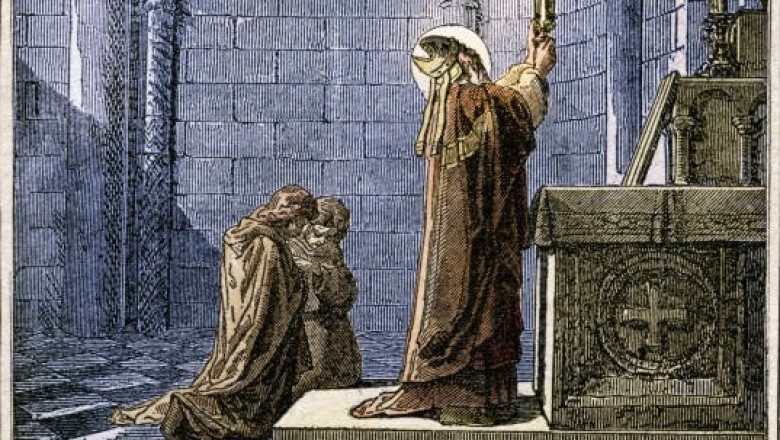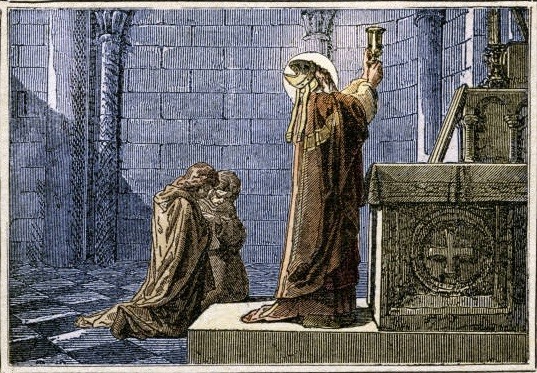
Saint Ludger of Münster: A Light of Faith and Transformation
Saint Ludger, also known as Liudger, stands as a beacon of devotion and missionary zeal in the early Christian history of Germany. Born around 742 in the region that would become modern-day Germany, Ludger's life spanned a transformative epoch during which Christianity began to take root strongly in German territories. His mission, marked by dedication, innovation, and spirituality, has had a lasting impact on the Christian community in the region.
Early Life and Education
Ludger was born into a noble family in the area now known as Friesland, a place where pagan traditions still held strong influence. His parents, who were devout Christians, recognized the significance of education and instilled in him a love for learning from an early age. Ludger was sent to the cathedral school in Utrecht, where he was educated under the guidance of the renowned theologian, Bishop Boniface. This pivotal time in his life not only nurtured his intellect but also ignited his passion for Christianity.
At the young age of 20, Ludger made a decision that would define his life's trajectory. Inspired by his studies and the example of his mentor, he chose to become a missionary. His heart was set on bringing the light of Christianity to those who had yet to embrace it, particularly in the regions of Friesland, which were still steeped in pagan practices.
A Missionary's Journey
Ludger's missionary work began with the daunting task of converting the local populace. The challenges were immense; he faced resistance, cultural barriers, and even personal danger. Nevertheless, his relentless spirit and unwavering faith inspired many. Ludger's approach was not merely to preach but also to engage with the people genuinely. He integrated himself into their lives, showing them the benefits of a Christian way of life, which included community support, education, and love.
One of the most notable aspects of Ludger's mission was his emphasis on education. He understood that true transformation came from knowledge and faith working hand in hand. To this end, he established schools that provided both spiritual and secular education. This initiative reflected his understanding of the holistic development of individuals and communities, which allowed many to embrace Christianity voluntarily.
Founding the Abbey of Werden
In the year 794, Ludger established the Abbey of Werden, which became a significant center for religious and educational activities. The abbey was not just a place of worship; it became a hub for learning and cultural exchange. As the abbey's first abbot, Saint Ludger cultivated an environment where monastic life flourished, emphasizing the importance of studying scripture, prayer, and communal living.
The establishment of the Abbey of Werden was a long-term endeavor, representing Ludger's vision for a renewed Christian community in the region. The monks were instructed to lead lives of piety, study, and service, which attracted many followers. Ludger's efforts helped bridge gaps between different communities and fostered an atmosphere of mutual respect and understanding.
The Diocese of Münster
Saint Ludger's influence extended beyond the abbey; in 804, he became the first bishop of the diocese of Münster. This elevation marked a significant recognition of his yearlong contributions to the Christian community. The diocese positioned him as a central figure in the ongoing efforts to solidify Christianity in the region. His role as bishop enabled Ludger to oversee numerous parishes, guiding the spiritual development of countless individuals.
As a bishop, he continued to advocate for education and the well-being of his community. He believed that a spiritually nourished community was fundamental to achieving social justice and harmony. He worked diligently to support local populations through various initiatives, including the construction of churches and schools, that would bolster spiritual and educational foundations.
Legacy of Saint Ludger
Saint Ludger passed away on March 26, 809. His legacy, however, continues to resonate through centuries of faith and community development. He was canonized soon after his death, with his feast day commemorated on March 26. His influence can be seen in various aspects of Church life in Germany and beyond.
The Abbey of Werden remains a testament to his vision and dedication. Today, it serves as a historical site that tells the story of Ludger's life and mission. Over the years, the abbey has acted as a center for religious learning and has been pivotal in shaping the cultural landscape of the region.
Beyond the confines of the abbey, Ludger's missionary spirit traveled far and wide. He inspired future generations of missionaries and religious leaders who followed in his footsteps, continuing the work of spreading the Christian faith and educating communities. His methodology of engaging deeply with people, valuing education, and fostering community spirit became a model for future missionary efforts.
Spiritual and Cultural Impact
Ludger's contributions have transcended mere historical significance; they also embody the spirit of cooperation and understanding among diverse cultural groups. He practiced an inclusive faith that respected local customs and traditions while ultimately guiding people toward a shared Christian identity. This approach not only facilitated the conversion of many but also encouraged cooperation between various communities during a time of significant social change.
Ludger's legacy is etched in the hearts and minds of many within the Münster diocese, where he is honored not only as a saint and bishop but also as a conscientious leader who laid the foundations for a community grounded in faith, education, and service. The values he championed remain relevant today, emphasizing the importance of compassion, cultural sensitivity, and the transformative power of education.
Personal Reflections and Stories
Many stories and anecdotes have been passed down through generations about Saint Ludger's kindness and wisdom. One famous tale recounts how he calmed a raging storm while on a boat, praying for God's mercy and protection. As the storm quelled, his companions witnessed the miraculous power of faith. Such stories have inspired countless individuals to trust unwaveringly in their faith during life's storms.
Another account tells of Ludger curing a local nobleman of a terrible ailment through prayer and the laying of hands—showcasing not only his extraordinary spiritual gifts but also his deep empathy for the suffering. These narratives, embellished over time, serve to reinforce the image of Ludger as not only a great leader but also a compassionate human being who truly understood the plight of the people he served.
Conclusion
Saint Ludger's life demonstrates the profound impact that one individual can have on the world. Through his determination, dedication, and faith, he championed a movement that changed the spiritual landscape of Germany. He emphasized that the core of Christianity lies in love, education, and community support, lessons that continue to resonate in today’s global society.
As we reflect on the life and legacy of Saint Ludger of Münster, let us remember the values he lived by: education as a pathway to empowerment, compassion as a means of forging connections, and unwavering faith as a source of strength. As we honor this remarkable figure on his feast day, may we be inspired to cultivate these virtues within ourselves and our communities, just as he did over a millennium ago.





















Comments
0 comment